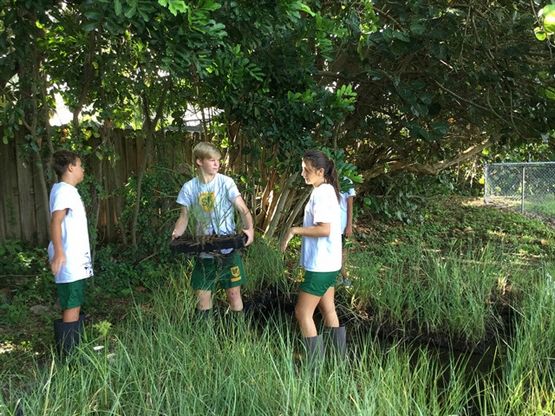

Middle School Marine Science Project - Fieldwork Launch
Source/Author: Kathryn Jeakle, Eighth Grade Marine Science Teacher
September 04, 2015
Shorecrest eighth graders have begun their fieldwork as part of the Coastal Awareness Program in Middle School Marine Science class. On Friday August 21, students took a short tour of the new restored ecosystem and identified native and invasive species. There they begun to place a name to plants and animals that they commonly see in the coastal area of St Petersburg. The following week, the eighth graders were introduced to the bay grasses (Spartina alterniflora) they will care for this school year. Caring for the bay grasses is a community restoration project that gives Shorecrest Middle School students a chance to maintain salt marsh grass on campus and then transplant them into the Bay with the hopes of increasing the acreage of salt marsh grasses in the Tampa Bay waters. At the end of the school year they will recycle the plot so that it is ready for the next group to take over.
The Middle School Marine Science course has an ongoing project made possible by a grant from the Tampa Bay Estuary Program. Funds for the Mini-Grant program come from sales of the Tampa Bay Estuary license plate, also known as the “Tarpon Tag.” The project, known as the Coastal Awareness Program (CAP), was designed to expose students to the natural environment in which they live with the final goal of creating educated citizens.
CAP has several different components that make it unique. One component is student participation in Bay Grasses In Classes program, which is a community restoration program sponsored by Tampa Bay Watch. Bay Grasses In Classes gives students the opportunity to maintain Spartina alterniflora(smooth cordgrass) on campus, and then transplant part of their plot in the Tampa Bay waters. The rest of the plot is recycled for the next generation of students.
A second component of CAP involves students being naturalists. We walk around campus and visit parks in the area to ID common species with the goal of students obtaining a basic level of knowledge regarding what lives around them.
The final component of CAP involves students learning how to collect water quality data and analyze it. The goal is to help them better understand the important role we have of caring for our surroundings. They learn about the Bay waters, what parameters are crucial for survial of species, and how we as educated citizen can make good choices to take care of our environment for future generations. The data that is collected is compared locally as well as globally.
The Middle School Marine Science course has an ongoing project made possible by a grant from the Tampa Bay Estuary Program. Funds for the Mini-Grant program come from sales of the Tampa Bay Estuary license plate, also known as the “Tarpon Tag.” The project, known as the Coastal Awareness Program (CAP), was designed to expose students to the natural environment in which they live with the final goal of creating educated citizens.
CAP has several different components that make it unique. One component is student participation in Bay Grasses In Classes program, which is a community restoration program sponsored by Tampa Bay Watch. Bay Grasses In Classes gives students the opportunity to maintain Spartina alterniflora(smooth cordgrass) on campus, and then transplant part of their plot in the Tampa Bay waters. The rest of the plot is recycled for the next generation of students.
A second component of CAP involves students being naturalists. We walk around campus and visit parks in the area to ID common species with the goal of students obtaining a basic level of knowledge regarding what lives around them.
The final component of CAP involves students learning how to collect water quality data and analyze it. The goal is to help them better understand the important role we have of caring for our surroundings. They learn about the Bay waters, what parameters are crucial for survial of species, and how we as educated citizen can make good choices to take care of our environment for future generations. The data that is collected is compared locally as well as globally.
After their two days of fieldwork, the eighth graders seemed to be to be excited about learning what is around them. Stay tuned to Ebytes for updates as the Coastal Awareness Program progresses throughout the year.
View more photos from the experience here.























